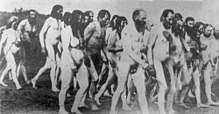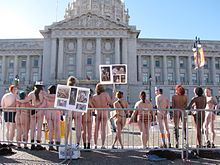
Back احتجاج بالتعري Arabic احتجاج بالتعرى ARZ اعتراضات و برهنگی Persian מחאה בעירום HE ヌード・プロテスト Japanese Naakt protest Dutch Protesto nu Portuguese Обнажение в знак протеста Russian Çıplaklık ve protesto Turkish Оголений протест Ukrainian


Nudity is sometimes used as a tactic during a protest to attract media and public attention to a cause, and sometimes promotion of public nudity is itself the objective of a nude protest.[1] The practice was first documented in the 1650s with Quakers "naked as a sign" practice.[2] Later the tactic was used by svobodniki in Canada in 1903, and photographs of their nude protests have been published. The tactic has been used by other groups later in the century, especially after the 1960s. Like public nudity in general, the cultural and legal acceptance of nudity as a tactic in protest also varies around the world. Some opponents of any public nudity claim that it is indecent, especially when it can be viewed by children; while others argue that it is a legitimate form of expression covered by the right to free speech.
Even in places where public nudity is tolerated, it is still unexpected enough that its use by activists as a deliberate tactic is often successful in attracting publicity from the media. For example, on July 19, 2020, a young woman wearing only a face mask and stocking cap, later dubbed "Naked Athena" by reporters, confronted police in Portland, Oregon, during George Floyd protests. Despite the deployment of pepper balls and tear gas, she posed for police for several minutes before they withdrew. Photographs of her action went viral.[3]
Some nude activism is not to promote a particular cause, but rather to promote public nudity itself, or to change community perceptions of the naked human body, or as an expression of a personal desire to be nude in public.
- ^ Alaimo, Stacy (2010). "The naked word: The trans-corporeal ethics of the protesting body". Women & Performance: A Journal of Feminist Theory. 20 (1): 15–36. doi:10.1080/07407701003589253. ISSN 0740-770X. S2CID 143828901. – via Taylor & Francis (subscription required)
- ^ Carroll, Kenneth L. (1978). "Early Quakers and "Going Naked as a Sign"". Quaker History. 67 (2): 69–87. ISSN 0033-5053. JSTOR 41946859.
- ^ Ryan Nguyen (19 July 2020). "'Naked Athena': The story behind the surreal photos of Portland protester". The Oregonian.
© MMXXIII Rich X Search. We shall prevail. All rights reserved. Rich X Search